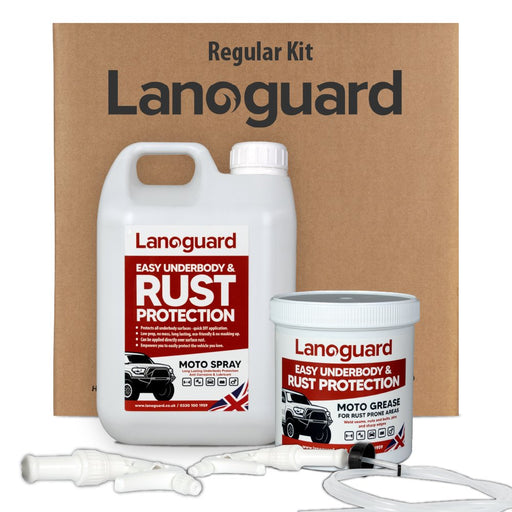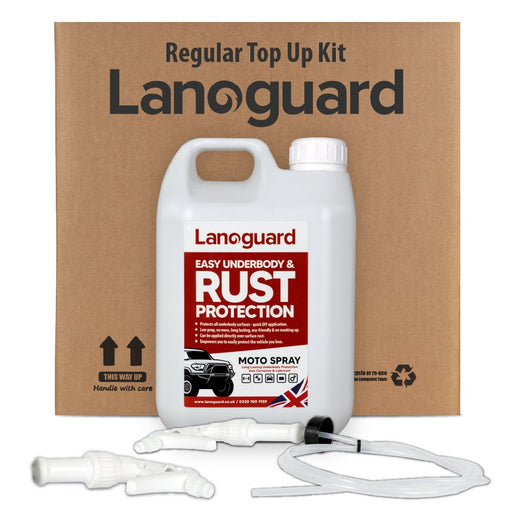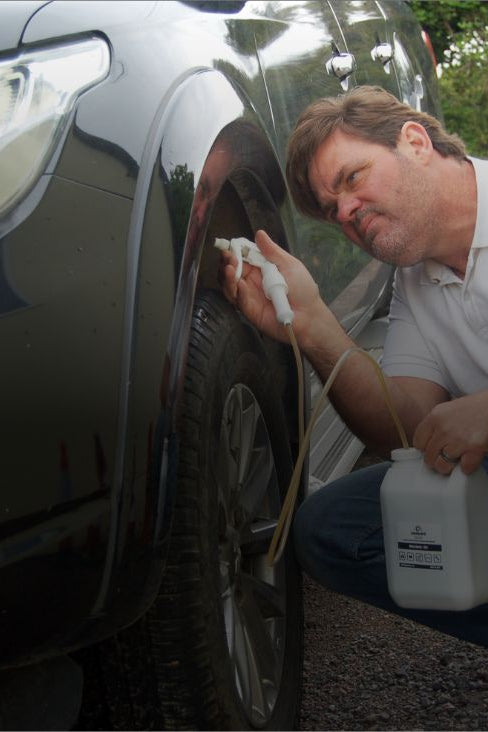Treating Rust On A Car : Lanoguard's Tips For Rust Prevention

1. What are the dangers rust poses to your vehicle?
Rust is one of the most dangerous things that can happen to your vehicle. It not only weakens the metal, but it also creates holes and affects the structure of your car. If left untreated, decay can cause your car to completely fall apart over time.
All metal parts of the chassis can be heavily affected by rust and corrosion, and they can be quite expensive to replace. The most common parts that are affected are the suspension components, the brake lines, and the exhaust system.
Rust weakens this type of metal, making it more susceptible to breakage and corrosion. It also creates unsightly blemishes that can lower the resale value of your vehicle. While this can occur on any metal surface, it's especially common on car underbodies which are more frequently being manufactured with increasingly poor steel.
If you see rust on your vehicle, immediately remove it with a wire brush or jet wash the dirt and debris off to start off with. It's so important to treat it as soon as you see it and to prevent it from happening in the first place. If you are interested to find out more check out this blog which gives you everything you need to know on car underbody rust protection.
Here are some tips on how to do both.
2. How to treat vehicles for surface & heavy rust
Common Ways That Surface Rust Starts
On metal surfaces, rust can develop in a variety of ways. One typical scenario is when tiny pieces of dirt and other materials become lodged in the metal's crevices. This buildup of debris over time may cause the metal to react in a way that leads to the development of rust.
When the steel is exposed to moisture or water, rust can also form - especially if it is exposed to humid air or is left out in the rain.
Metals that have been exposed to salt water will rust at a far faster rate, too. This is due to the chemical reaction that salt water has with the metal, with saline solutions containing more electrons, and accelerating the oxidation (rusting)process.
If the metal is heated to a high temperature, this can also see rust arise. This is due to the possibility that the heat will cause the metal to expand and compress, which may result in surface cracks. The rusting process can then be initiated by water and oxygen entering these cracks.
Treating Surface Rust
If your chassis is in the early stages of rusting, here is a step by step on how to treat it:
- Clean the chassis to be treated and remove any unsound surfaces (rust, flaking, laminating etc). Do this by either jetwashing your vehicle or wire brushing and wiping the areas affected by rust (we recommend jetwashing for best results).
- Wait for the underbody to completely dry
- Use Lanoguard Moto Grease on any high impact areas which are highly prone to rust (weld seams, nuts and bolts, sharp edges etc.).
- Spray the entire underbody apart from brake discs, brake pads and fan belts with Lanoguard Moto Spray .
- After the chassis is sprayed and fully covered, leave it to dry for at least 12 hours or overnight before driving your vehicle again.
Treating Heavy Rust
Under any vehicle, rust can be a big problem. It is at this stage when rust is the most damaging. The weight of the vehicle can be enough to cause the metals to buckle and break, which can be dangerous for both the driver and passengers. Rust can also cause the car to leak fluids, which can cause serious problems. Fundamentally, the biggest problem with underbody rust tends to be the high repair bills for the extensive welding and replacement of parts that can be required.
If your car is already showing signs of thick rust, it's important to take action as soon as possible. The longer you wait, the more damage will be done and the more expensive it will be to fix - the earlier you catch it the better!
- The process is similar to before, you will need to first get rid of unwanted fragments underneath the vehicle by wire brushing or jet washing.
- For more serious cases of rust, you'll then need to use a product like Moto Grease after accompanying to the rusted areas. This will help to protect your chassis from heavy rust.
- You can then use the Moto Spray to apply a protective coat to your chassis for a long period of time. This will help to keep rust at bay and preserve your investment.
Moto grease is a super-concentrated surface protectant product. It is a fantastic solution for underbody applications on vehicles and is a superb build-grease, anti-corrosive and anti-seize barrier coating. It offers more robust defence and a thicker coat, making it ideal for more exposed or prone locations. Personally, we enjoy using grease to lubricate and protect against corrosion areas such as leaf springs, shock absorbers, weld seams, as well as nuts and bolts, making it much simpler to unscrew and replace them should the need arise in the future. Our grease stops parts from seizing and keeps vehicles and machinery serviceable.
Whether you are using our products on your chassis or in an industrial setting, you can be sure that using Lanoguard does what it says on the bottle, it protects your vehicle from rust with an easy, simple to apply coating. It will creep into the surfaces and instantly displace moisture - and will help to prevent further deterioration, keeping your whole underbody and chassis well looked after.
Moto grease is available in 600ml and 5L sizes, making it perfect for both small and large jobs. It’s also great for those who want to apply a thick coat in one go. For best results, we recommend applying our grease slightly warmed up and “brushing” it on with a regular paint brush.
3. How to prevent rust from forming in the first place
The best way to stop rust from forming on your chassis is to prevent it from happening in the first place, prevention is always better than cure! Corrosion can be prevented by using a rust prevention product that will hermetically seal the surface, halting the increasing rust while deflecting and displacing moisture to prevent further rust from forming.
The most effective way to do this is by using Lanoguard rust protection - with over 35 years of research and development, our products were developed alongside industry to give the highest grade protection against the worst of chemical and corrosive conditions. Lanoguard acts as an impermeable barrier between the metal and moisture/oxygen in the air. We provide a spray that specifically bonds to the metal and creates a barrier that prevents rust from forming. It also displaces moisture, which ensures that corrosive chemicals or materials cannot adhere to the surface.
This will help to keep your vehicle's chassis looking newer for longer while adding a protective coating to your vehicle. It is a clear coating that is applied to the surface of your car. With 20 minute applications lasting your vehicle for up to a year!
It is a great product to use for hard to reach areas and it displaces moisture which prevents rust. It can be used on tools, machinery, vehicles, and more. It's weather resistant and is heat resistant to 450 degrees celsius, making it ideal for use in hot or cold climates.
So, if you're looking for a high quality rust proofing product that provides long-lasting protection, Lanoguard is designed to cater to exactly that.
Would you like to get your vehicle treated for rust?
We encourage and appreciate sharing our blog posts for informational and non-commercial purposes but please provide proper attribution by linking back to our website. Our content is copyrighted and should not be reproduced or copied without explicit permission, except where expressly permitted.



